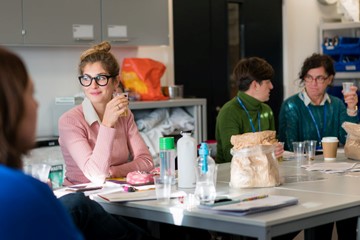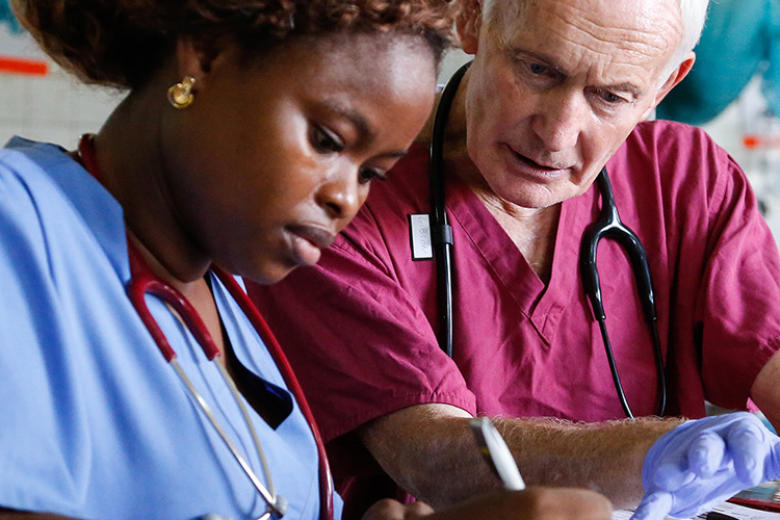Postgraduate study at QMU

Postgraduate study at QMU
Postgraduate study at QMU can help you climb the career ladder in your current profession, allow you to change profession, or be the foundation for an academic career. All QMU’s postgraduate courses aim to be professionally and socially relevant to the world we live in, while developing and enhancing your skills and career options.
Many of our courses have flexible learning options, including online learning and part-time options which can fit around your current life and work.
Our subject areas include:

Advancing Practice in Health
QMU's Advancing Practice in Health framework is for those who want to make a difference to the lives of others locally, nationally and globally. We welcome professionals already working in health-related fields such as allied health, nursing and nutrition, and other professionals like medical practitioners, pharmacists, dentists, and those working in public health, the community and the voluntary sector.
The framework aims to foster and develop QMU's mission of cultivating intellectual capital with both a theoretical and practical focus. Learning and teaching is underpinned by research, evidence and scholarship against the background of current and evolving political and social landscape for health and wellbeing. The study options range from single modules to full degrees, with the emphasis on online learning, so you can study wherever you are in the world.

Business
As a member of the Chartered Association of Business Schools, the Queen Margaret Business School offers postgraduate courses designed to suit those who may not have a business background. Our courses are suitable for new graduates, as well as those who have been in the workplace for some time.
Queen Margaret Business School has a culture defined by strong personal relationships, informality and flexibility. We encourage our students to be truly ambitious, to experiment, innovate and take risks. To drive this, we foster a respectful challenge and debate culture, which blends research-based academic excellence with current business experience.

Culture and Creativity
In its many forms, the importance of culture are recognised by politicians and intellectuals at a national, international and global level. Culture is a significant contributor to economic wealth and prosperity, and to the growth of social diversity and progress. Culture is a defining characteristic of identity and heritage and creates experiences that stimulate individual curiosity and imagination. With our Edinburgh location, we have strong connections to the rich cultural sector of Scotland’s capital city, the ‘festival city’.
Our postgraduate Culture and Creativity courses at QMU focus on the challenges and problems that arise when moving from curiosity and imagination to creation and organisation. It addresses a wide range of situations, from globally recognised companies to individual creators, from corporate conglomerates to state-supported institutions, from cultural divas to voluntary associations. By applying practical experiences and research, postgraduate study at QMU recognises that culture's value derives from innovation, change and uncertainty, and that cultural experiences are different and singular.

Dietetics, Nutrition, Biological Sciences, Physiotherapy, Podiatry and Radiography
The Division of Dietetics, Nutrition, Biological Sciences, Physiotherapy, Podiatry and Radiography (DNPPR) has extensive knowledge and skills in allied health professional education, public health, community and voluntary sectors.
Our location near Edinburgh city centre positions us close to crucial players in national and local government, large hospitals, companies, research laboratories, and government offices. The links to our hospital, private practice, and third sector partners across Scotland are essential to ensure that our students have access to valuable placement experiences at the core of their training. Our courses reflect that QMU is a key Scottish institution for postgraduate education in this area, and staff have very close links with the profession across the county.

Education
For many decades, QMU was renowned internationally for the training of domestic science teachers. We returned to our roots in 2019 when we launched our new PGDE Secondary (Home Economics) course, building on niche provision in other educational areas. This one-year course addresses a skills shortage in home economics teaching within our secondary schools. The course educates aspiring teachers, preparing them to fill vital posts in secondary schools and positively influence young people’s knowledge and skills relating to food, nutrition, health and lifestyle.
Located in the Division of Psychology, Sociology & Education, our education courses draw on a firm foundation of psychological and sociological knowledge and practice. We also champion effective collaborative working between allied health professionals and educators, collaborate with our experts and a range of professionals in child development, welfare and wellbeing.
Our postgraduate education programme focuses on the needs of today’s educators in a rapidly changing society. QMU offers a critical approach to working with learning and teaching in today’s communities and explores the interface of social justice, wellbeing, learning and creativity in a variety of exciting ways.

Gastronomy
QMU's innovative MSc Gastronomy course offers students the opportunity to engage in the multidisciplinary study of food. This programme explores how food touches and influences all parts of our lives by examining its role in the complex connections between culture, communication, systems, science, sustainability, production and politics.
This experiential course uses field trips, site visits, practical workshops and expert speakers to explore food from a wide range of angles. On this course, you will gain invaluable insight into the many different ways that food shapes the world around us. You will also examine how a better understanding of food can help address not just food-related problems but many of the world's most pressing social, environmental and public health issues.

Global Health and Development
Queen Margaret University is home to the Institute for Global Health and Development (IGHD), which provides high-quality courses that draw together participants from diverse cultural, professional and academic backgrounds to share a student-centred experience of mutual learning and support.
Our work in the field of global health and development has a history of more than 25 years. We delivered the first postgraduate diploma in primary health care aimed at participants from the global south in the UK, and our portfolio of courses and focus continues to grow to this day.
Since our establishment, we have equipped more than 500 master’s and doctoral alumni from sub-Saharan Africa, South and East Asia, the Middle-East, Europe and the Americas for work in the health, development and humanitarian sectors.

Media, Communications and Public Relations
QMU has a long history of teaching media, communications and public relations. Our teaching team combines years of professional experience with research-informed academic expertise. We contribute to cutting edge publications and make award-winning films and digital content.
We offer a range of taught master’s degree courses that can give you the opportunity and confidence to build your career in the media and communication industries. Our programmes are unique in Edinburgh and keep track of current developments in this dynamic and ever-changing field of practice.
QMU has strong links with major global media, communication and creative organisations and invites senior executives and policymakers to provide students with first-hand insights into professional practice. Many of our industry contacts regularly offer placement opportunities to our students.

Occupational Therapy and Arts Therapies
Occupational therapists and arts therapists make a significant contribution to Scotland’s health education and social care sectors. Our pre-registration courses help graduates become qualified occupational therapists, music therapists, art psychotherapists and play therapists. We attract many international students to these courses..
We also offer qualified occupational therapists the opportunity to explore their practice in more depth. As a postgraduate student, the opportunities to gain invaluable experience through applying your learning directly to your workplace allow you to contribute to the modernisation of occupational therapy, arts therapies and healthcare globally.
Our staff have many years of experience in occupational therapy and arts therapies, and ensure the individual student’s future working needs are embedded in their postgraduate study.

Person-centred Practice
Delivered by our Division of Nursing, Occupational Therapy and Art Therapies, the postgraduate portfolio that includes the MSc Person-Centred Practice Framework reflects the burgeoning focus on person-centredness set within the contemporary context of health systems integration and the health and wellbeing agenda.
This reflects professional and service needs identified by the relevant professional bodies, other stakeholders and policy drivers. The framework offers practitioners from different contexts the opportunity to develop their studies and enhance their knowledge and expertise of person-centred practice through a flexible structure, designed to meet their needs and those of the wider community.
QMU works at a national and international level to develop nursing and healthcare's role and reputation throughout the world. With collaborations in many countries worldwide, we have developed a reputation as a significant contributor to practice development internationally. Students on our master's courses also reap the benefits of learning with students from other cultures. As a postgraduate student, the opportunities to gain invaluable experience through applying your learning directly to your workplace allow you to contribute to the modernisation of healthcare globally.

Public Sociology is a discipline that speaks to, and for, audiences and communities beyond academia and makes meaningful contributions to ongoing debates around public issues and concerns.
QMU has a long-standing track record of delivering postgraduate courses in governance, justice and public management. We are particularly well suited to providing education and research in public sociology at QMU because our vision and values as an institution emphasise the importance of social justice.
Our innovative PgCert Public Sociology is about understanding society and how to bring about change. This course is for sociology graduates looking to specialise in public sociology and people engaged in community work, social welfare, public engagement, or campaigns who would like to learn how sociological theory and research can meaningfully contribute to their work. The course draws on our academics’ extensive work with NGOs and humanitarian and community groups, in the UK and overseas. Our course is highly professionally relevant. We use guest speakers, external consultants and experienced professionals alongside research-active academics to ensure our content is context-driven and practice-orientated. As an institution, our philosophy emphasises student support and our relatively small size means that we can develop strong working relationships with all our students.

Communication is at the core of human society. Without it, people are excluded from education, employment and social interaction. Speech and language therapists, audiologists and British Sign Language (BSL) interpreters all support people to communicate more effectively so that they can engage fully in society.
At postgraduate level, the Speech and Hearing Sciences division at QMU offers a range of options for students seeking professional registration and those who are already practising professionals. Pre-registration courses are designed for graduates who wish to be educated to master’s level to qualify as either a speech language therapist or audiologist. A range of modules are also available for qualified audiologists, speech and language therapists or other professionals in related areas who wish to advance their practice, and these may contribute to postgraduate awards.
Speech and Hearing Sciences at QMU offers prospective students a small and friendly environment for learning. Our professionally relevant courses are designed to meet the changing needs of students, employers and society. The presence of audiology, BSL/English interpreting and speech and language therapy courses within the same university subject area is unusual in the UK, but has significant potential benefits, given the complex interplay between the biological, psychological, social and cultural factors that underlie communicative behaviour. Students on pre-registration courses are supported by a multi-professional staff team, facilitating understanding of the links between hearing, speech and communication.
Find more about all of our subject areas at Postgraduate Study at QMU.